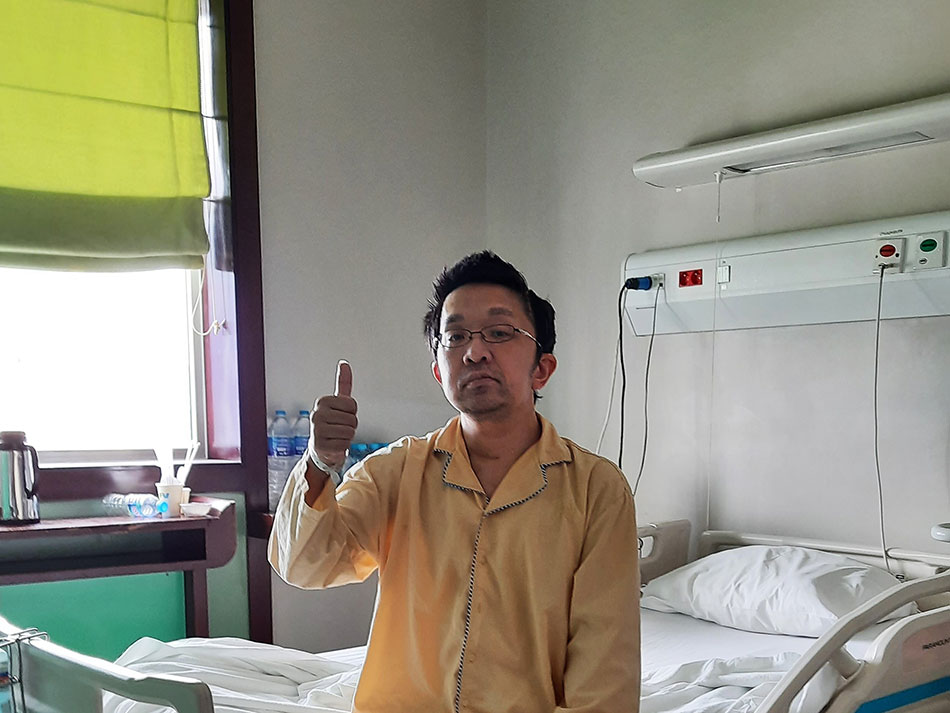On May 26, Dr Vu Truong Son, Head of Infection Control Unit, FV Hospital, received a call for urgent assistance from the City Centre for Disease Control (HCDC). Mr T.T., a 42-year-old professional visiting from Japan, had been quarantining at a hotel in District 7 when he fell and hit his head on the floor. His initial condition was determined as loss of blood and unconsciousness.
Saving patients’ lives is a top priority
Upon arrival at FV Hospital’s Accident & Emergency (A&E) Department, the patient was placed in a negative pressure isolation room in accordance with COVID-19 prevention procedures. At that time, the patient had fallen into a coma so emergency doctors ordered a CT scan, and at the same time informed the team of doctors on duty at the departments of Neurosurgery, Anaesthesiology and Resuscitation and Infection Control to immediately conduct a multidisciplinary meeting.
The patient was identified with an epidural haematoma and coma. FV doctors decided to perform an emergency surgery, transferring the patient to the operating room with a special ventilation design for patients at risk of COVID-19 infection to ensure disease prevention as well as surgical safety. Leading the surgical team, Head of Neurosurgery Dr Nguyen Manh Hung said that when he arrived at the operating room, the patient was in a deep coma, his pupils dilated. In such cases, the earlier a surgery is performed, the higher the survival rate. Therefore, immediately after finishing the previous surgery, Dr Hung immediately operated on this critical case. Because the patient had no known relatives to contact and the situation was urgent, Dr Nguyen Manh Hung was the one who signed the consent for surgery. “In addition to being confident in my ability and the whole team, I am also very confident in the administrative policies at FV Hospital. The Board of Directors always create ideal conditions for all members to focus on our expertise and do our best to save patients’ lives, so we didn’t need to delay a second longer for this surgery,” added Dr Manh Hung.
The surgical team opened the skull, removed all haematoma and stopped the bleeding to help reduce intracranial pressure for the patient. When opening the skull, Mr T.T. instantly lost about two litres of blood, but after nearly two hours of surgery, his brain showed signs of revival. Initial assessment revealed that the surgery was successful and had brought Mr T.T. back from the brink of death. The next day, Mr T.T. was transferred to the Intensive Care Unit (ICU) for further monitoring.

Dr Nguyen Manh Hung and ekip were in a spine surgery
In the recovery room, the patient was mechanically ventilated, and actively sedated to avoid brain damage. Every day, doctors evaluated and gradually resuscitated the patient’s nerves. After more than 20 days, Mr T.T. was awake and able to recognise his surroundings. Participating in the surgical and postoperative recovery team, Dr Nguyen Thi Lam Giang, Head of Anesthesiology and Resuscitation, said: “The patient suffered severe brain damage, so the recovery time was slow and the prognosis is conservative, but good progress has been made so far. We are helping the patient practice his reflexes as well as active physical therapy and psychotherapy and pay attention to his nutrition to help him return to normal soon.”
FV’s team always tries to fully treat all of a patient’s issues
After recovering from the critical stage, the patient continues to be treated in the High-Dependency Unit (HDU), before being transferred to the regular ward. Dr Lam Giang said that in brain injury cases, due to unstable nerves, need constant monitoring from doctors and nurses to avoid dangerous events such as choking, falls, panic attacks, disorder and depression. In addition to physical therapy and nutrition, it is necessary to interact regularly with the patient to lift their spirits.
Immediately after Mr T.T. became conscious, Dr Manh Hung re-examined him and discovered that the patient was suffering from symptoms of numbness, pain and reduced motor function in the left half of his body. Combined with imaging results, doctors diagnosed the patient with a cervical spine injury, possibly caused by the fall. Initially, the patient’s family representative planned to transfer him to Japan for further treatment. However, Dr Manh Hung strongly indicated that early surgery was needed to help the patient recover nerve functions quickly. Therefore, after two months, when the brain was recovering well, Mr T.T.’s representative agreed to let Dr Manh Hung and his team carry out skull reconstruction surgery and cervical vertebrae surgery.
Thus, with three surgeries, the doctors not only saved Mr T.T.’s life, but also helped him solve other problems that may have affected his quality of life later. Usually for these cases, after being discharged from the hospital, the patient will need to be re-examined every three months to assess the possible sequelae and the effectiveness of treatment. After two years, the evaluation process is considered complete.

Mr T.T. before being discharged from FV Hospital
After more than 100 days in hospital, on September 11, Mr T.T. was very happy and said that his health had recovered immensely and he was ready to be discharged. “I am very grateful to the doctors who bravely saved my life in that situation. At the hospital, everyone who took care of me was also very dedicated. Following this accident, I think I have to be much more careful,” he said.



